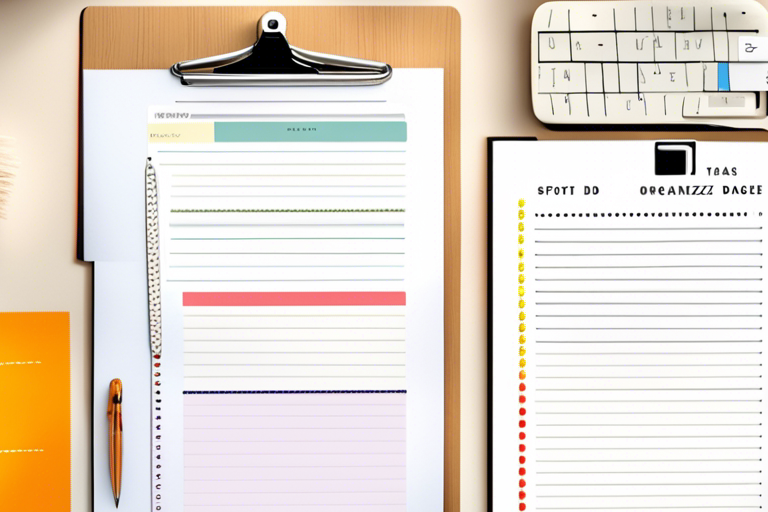Are you tired of putting off important tasks even though you know they need to be done? Do you constantly find yourself procrastinating, only to feel stressed and overwhelmed later? If so, you’re not alone. Procrastination is a common challenge that many people face, but the good news is that there are powerful techniques you can use to overcome it and boost your productivity.
In this blog, we will explore 10 effective techniques that will help you break free from the grip of procrastination and take control of your time. From practical strategies to mindset shifts, we’ve got you covered. Whether you struggle with procrastination at work, in school, or in your personal life, these techniques can be applied to any situation.
Throughout this article, we will dive deep into each technique, providing practical examples and actionable steps that you can implement right away. No more empty promises or vague advice. We believe in providing you with the tools and information you need to make a real difference in your life.
So, if you’re ready to finally conquer procrastination and unleash your full potential, let’s jump right in and explore these 10 powerful techniques together.
Short Summmery

- Procrastination is a common challenge faced by many individuals, but there are effective techniques to overcome it and boost productivity.
- Understanding the psychology behind procrastination, such as negative feelings and unrealistic expectations, can help in finding solutions.
- Breaking down tasks into smaller, manageable steps and creating a to-do list can improve time management and increase productivity.
- Prioritizing tasks and setting deadlines provide a sense of urgency and ensure important tasks are completed on time.
- Creating a productive environment, whether it’s finding a suitable study location or surrounding yourself with visual cues, can enhance focus and motivation.
- Overcoming mental blocks and negative scripts by practicing self-compassion and reframing negative thoughts can help overcome procrastination.
- Implementing these 10 techniques can be applied to various aspects of life, such as work, school, or personal goals, to overcome procrastination and unleash one’s full potential.
1. Understanding Procrastination
Procrastination is a common challenge that many people face when it comes to managing their tasks effectively. It refers to the act of delaying or putting off important tasks, often opting for less important or easier ones instead. This can lead to a cycle of increased stress, missed deadlines, and a decrease in overall productivity.
Procrastination typically follows a predictable pattern. It starts with the initial phase of feeling overwhelmed by the task at hand or experiencing a negative feeling towards it. This may be due to the task being complex, time-consuming, or challenging. As a result, individuals may have a tendency to avoid the task and delay starting it.
2. Identifying Procrastination Triggers
To overcome procrastination, it is crucial to identify the triggers that lead to this behavior. Procrastination triggers can vary from person to person, but common ones include fear of failure, lack of motivation, perfectionism, or feeling overwhelmed. By recognizing these triggers, individuals can start to develop strategies to address and overcome them.
3. Breaking Tasks into Smaller Steps
One effective technique to combat procrastination is to break tasks into smaller, more manageable steps. By doing so, large and daunting tasks are divided into smaller, more achievable ones. This not only helps to reduce feelings of overwhelm but also provides a sense of progression and accomplishment as each subtask is completed.
4. Creating a To-Do List
A to-do list is a valuable tool for organizing and prioritizing tasks. It allows individuals to visualize their workload and focus on completing one task at a time. Prioritizing tasks based on importance and deadlines can help to prevent procrastination and promote better time management.
5. Utilizing Time Management Techniques
Implementing effective time management techniques can greatly assist in overcoming procrastination. Techniques such as the Pomodoro Technique, where work is broken down into focused, timed intervals, can help maintain productivity and prevent burnout. Additionally, allocating specific time slots for each task and eliminating distractions can help maintain focus and avoid procrastination temptations.
6. Utilizing Commitment Devices
Commitment devices are tools or strategies designed to increase accountability and motivation. For example, sharing goals and progress with a study group or a trusted friend can create a sense of external accountability. Additionally, utilizing tools like accountability apps or setting up rewards for completing tasks can provide added motivation and discourage procrastination.
7. Cultivating Self-Compassion It
2. The Negative Effects of Procrastination
Procrastination, the act of delaying or putting off tasks, can have detrimental effects on various aspects of our lives. Understanding these negative effects can provide the necessary motivation to overcome procrastination and boost productivity. Let’s explore some of the key consequences that procrastination can have:
1. Increased Stress and Anxiety:
When we procrastinate, unfinished tasks pile up and create a constant feeling of overwhelm. This leads to increased stress and anxiety as deadlines approach, affecting our mental well-being and overall productivity.
2. Poor Time Management:
Procrastination often results in poor time management. By constantly delaying tasks, we fail to allocate time effectively, causing important duties to be rushed or even left unfinished. This disorganization can hinder our ability to meet deadlines and fulfill responsibilities.
3. Missed Opportunities:
Procrastination can lead to missed opportunities, both personally and professionally. When we keep postponing important tasks, we may miss out on chances for personal growth, career advancements, or even valuable experiences. This can have long-term repercussions on our goals and aspirations.
4. Decline in Performance:
As the habit of procrastination takes hold, our performance may suffer. When we leave tasks until the last minute, we deprive ourselves of the necessary time and energy to produce high-quality work. This can result in lower grades, missed targets, and a general decline in our overall performance.
5. Damage to Relationships:
Procrastination can also negatively impact our relationships. Constantly putting off commitments and promises to family members, friends, or colleagues can erode trust and lead to strained interactions. This can have a lasting impact on personal and professional relationships.
6. Decreased Self-Esteem:
Repeatedly procrastinating and failing to accomplish tasks can erode our self-esteem. It creates a cycle of self-doubt and negative self-talk, reinforcing feelings of inadequacy. This, in turn, fuels further procrastination and perpetuates a cycle of decreased productivity.
💡 key Takeaway: Procrastination can have significant negative effects on our overall well-being, time management, performance, relationships, and self-esteem. Understanding these consequences is crucial for breaking the habit and adopting strategies to overcome procrastination and boost productivity.
3. Breaking Down Tasks for Better Time Management
Breaking down tasks into smaller, manageable units is a powerful technique for improving time management and overcoming procrastination. By breaking down a large task into smaller, more manageable subtasks, you can alleviate feelings of overwhelm and make progress more easily. Here’s how you can implement this technique effectively:
1. Identify the task: Start by clearly defining the task at hand. Be specific about what needs to be accomplished and establish a clear understanding of the end goal. For example, if you have a research paper to write, define the topic, scope, and required deliverables.
2. Divide and conquer: Once you have a clear understanding of the task, break it down into smaller subtasks. Consider the individual components or steps required to complete the task successfully. For instance, for the research paper, subtasks could include conducting literature reviews, organizing notes, outlining the paper, writing individual sections, and editing.
3. Prioritize subtasks: Determine the order in which the subtasks should be completed. Consider dependencies, deadlines, and the level of effort required for each subtask. Prioritizing subtasks ensures that you tackle the most important and time-sensitive aspects first, enabling you to make progress systematically.
4. Set realistic timelines: Assign realistic deadlines to each subtask based on their complexity and urgency. Be mindful not to create unrealistic expectations that may lead to unnecessary stress or pressure. Setting reasonable timelines encourages a balanced approach to completing tasks and helps prevent procrastination.
5. Visual cues and reminders: Create visual cues or reminders to help you stay focused and motivated. For instance, use a to-do list or a task management app to track your progress and mark off completed subtasks. Visualizing your progress can be highly motivating and reinforce your sense of accomplishment.
6. Use commitment devices: Implement commitment devices to hold yourself accountable. These can be simple strategies like sharing your goals with a study group or a family member, or using a productivity app that tracks your progress. The involvement of others or the added layer of external accountability can increase your commitment to completing the tasks at hand.
7. Celebrate achievements: Celebrate your progress and achievements along the way. Recognize the effort and hard work you’ve put into completing each subtask, and reward yourself accordingly. This positive reinforcement and self-compassionate approach can boost motivation and encourage continued progress.
By breaking down tasks into smaller, manageable units, you create a clear roadmap for success. This approach not only helps you combat the negative feelings associated with overwhelming
4. Prioritizing and Setting Deadlines
Prioritizing and setting deadlines are crucial techniques for overcoming procrastination and boosting productivity. By organizing tasks based on their importance and assigning specific deadlines to each, you can manage your time effectively and stay focused on accomplishing your goals.
Start by creating a comprehensive to-do list that includes all the tasks you need to complete. Write down everything that needs to be accomplished, whether it’s a small task or a big project. Breaking larger tasks into smaller, manageable steps can make them less overwhelming and easier to tackle.
2. Identify Important Tasks:
Once you have a list of tasks, evaluate their importance. Identify the tasks that have the highest priority and require immediate attention. Consider the consequences of not completing these tasks, such as missing a deadline or negatively impacting your academic or professional performance.
3. Use the Eisenhower Matrix:
The Eisenhower Matrix is a valuable tool for prioritizing tasks. It categorizes tasks into four quadrants based on their urgency and importance:
Urgent and Important: These tasks should be your top priority and need to be addressed immediately.
Important but Not Urgent: These tasks should be scheduled and given attention to prevent them from becoming urgent.
Urgent but Not Important: Delegate or eliminate these tasks whenever possible, as they may distract you from more important work.
Not Urgent and Not Important: These tasks can be postponed or removed from your to-do list altogether.
4. Set S.M.A.R.T. Deadlines:
S.M.A.R.T. stands for Specific, Measurable, Achievable, Relevant, and Time-Bound. When setting deadlines, ensure they meet these criteria. Break down larger tasks into smaller sub-tasks and assign realistic deadlines to each. This enables you to track your progress and maintain a sense of accomplishment as you complete each sub-task.
5. Utilize Visual Cues:
Visual cues can serve as reminders for tasks and deadlines. Consider using a physical or digital calendar, sticky notes, or task management apps to keep track of your deadlines. Seeing your deadlines visually can help you stay on top of your tasks and motivate you to complete them.
6. Practice Time Blocking:
Time blocking involves scheduling specific time slots for different tasks or activities. Allocate dedicated time for important tasks in your daily or weekly schedule. By blocking out time in advance, you are more likely to prioritize and focus on specific activities during those designated periods.
7. Employ Commitment Devices:
Commitment devices
5. Creating a Productive Environment
A cluttered and disorganized workspace can often contribute to procrastination and a lack of productivity. When your surroundings are chaotic, it’s easy to get distracted and lose focus on the task at hand. To overcome procrastination and boost productivity, it’s crucial to create a productive environment that supports your goals and helps you stay on track. Here are some powerful techniques to help you do just that:
1. Declutter and organize your workspace: Start by clearing away any unnecessary items and keeping only the essentials on your desk. Create designated spaces for different materials, such as folders for documents, trays for incoming and outgoing tasks, and containers for stationery. Keeping your workspace clean and organized will help reduce distractions and improve your ability to concentrate.
2. Utilize visual cues: Visual cues can serve as reminders of the tasks you need to complete. Place a to-do list or a task board in your line of sight, so you can visually see your goals and prioritize your work accordingly. Color coding can also be useful in categorizing tasks and creating a sense of order.
3. Designate a specific study or work area: Having a dedicated space for studying or working can signal to your mind that it’s time to focus. This could be a quiet corner in your room, a local library, or a café where you feel productive. Find a place where you can minimize distractions and create a conducive environment for concentration.
4. Set the right ambiance: Your environment plays a significant role in your productivity. Experiment with different lighting, temperature, and background noise levels to find what works best for you. Some people find that soft instrumental music helps them concentrate, while others prefer complete silence. Find the ambiance that puts you in the zone and enhances your productivity.
5. Minimize digital distractions: Electronic devices can be a major source of procrastination. Consider implementing strategies to limit their impact on your productivity. For example, you can use website blockers to prevent access to distracting websites during work/study sessions. Additionally, turning off irrelevant notifications on your phone can help you stay focused on the task at hand.
6. Surround yourself with supportive people: The people you surround yourself with can influence your productivity levels. Choose to spend time with individuals who are driven, focused, and supportive of your goals. Join a study group or seek out like-minded individuals who share your commitment to productivity.
💡 key Takeaway: Creating a productive environment is essential to overcome procrastination and increase productivity. By decluttering
6. Overcoming Mental Blocks and Negative Scripts
Mental blocks and negative scripts can be major roadblocks on the path to productivity. These are the thoughts and beliefs that hold us back and make us doubt our abilities. However, overcoming these hurdles is essential to boost productivity and overcome procrastination. Here are some powerful techniques to help you tackle mental blocks and negative scripts head-on:
1. Challenge your negative thoughts: One common form of negative script is self-doubt. When you catch yourself thinking, “I can’t do this” or “I’m not good enough,” challenge those thoughts. Ask yourself if they are based on evidence or if they are simply limiting beliefs. Replace them with positive and affirming statements instead.
2. Practice self-compassion: Be kind to yourself when facing challenges. Understand that everyone has off days and setbacks. Treat yourself with the same kindness and understanding that you would give to a friend. Remember, failure is not a reflection of your worth.
3. Break tasks into smaller units: Large tasks can feel overwhelming and contribute to procrastination. Break them down into smaller, more manageable units. By focusing on one small task at a time, you’ll make progress and build momentum to tackle the larger task.
4. Utilize commitment devices: Commitment devices are strategies that help you stick to your goals. Use tools like timers, reminders, or accountability partners to stay on track. These external motivators can help you overcome procrastination by creating structure and a sense of urgency.
5. Create a positive study environment: Your environment can greatly influence your productivity. Find a quiet, well-lit space where you can concentrate without distractions. Surround yourself with study materials, inspirational quotes, or a vision board to stay focused and motivated.
6. Use visualization techniques: Visualize yourself successfully completing the task at hand. Imagine the satisfaction and pride you will feel when you overcome procrastination and achieve your goals. This mental rehearsal can increase your motivation and make the task seem more achievable.
7. Develop a growth mindset: Embrace the belief that your talents and abilities can be developed through dedication and hard work. View challenges as opportunities for growth and improvement, rather than reasons to give up. A growth mindset helps you overcome obstacles and stay motivated.
8. Seek support from others: Don’t hesitate to reach out to friends, family members, or study groups for support. Sharing your goals and progress with others can keep you accountable and provide valuable encouragement.
9. Practice time management techniques
Conclusion
In conclusion, overcoming procrastination is crucial for boosting productivity. By implementing these powerful techniques discussed in this blog, you can take control of your time and energy, ultimately achieving your goals more efficiently. Remember, it all starts with understanding the root cause of your procrastination and then implementing strategies tailored to your specific needs. Firstly, breaking tasks into smaller, manageable steps can help to alleviate overwhelm and make it easier to get started.
Additionally, setting clear, specific goals and creating a schedule or to-do list can provide structure and accountability. Utilizing technology, such as productivity apps or time-tracking tools, can also help you stay focused and prioritize tasks effectively. Furthermore, eliminating distractions and creating a conducive work environment can significantly improve your ability to concentrate. Util
FAQ
How do I prioritize and set deadlines?
Prioritizing tasks and setting deadlines is essential for overcoming procrastination and boosting productivity. Here are 5 steps to help you prioritize and set deadlines effectively: Make a list of all your tasks and responsibilities. Determine which tasks are most important and urgent. Set realistic deadlines for each task. Break down larger tasks into smaller, manageable chunks. Use a planner or scheduling tool to keep track of your deadlines and progress.
What are some techniques for breaking down tasks?
Some techniques for breaking down tasks include: Making a to-do list and breaking down larger tasks into smaller, more manageable subtasks Using the Pomodoro Technique, which involves setting a timer for 25 minutes and focusing solely on one task during that time Prioritizing tasks and tackling the most important or urgent ones first Setting specific and achievable goals for each task Breaking down tasks into specific action steps and focusing on completing one step at a time.
What is procrastination and why do we do it?
Procrastination is the act of delaying or postponing tasks or activities that need to be completed. It is a common behavior that affects many people, and it is often associated with feelings of stress, anxiety, and guilt. People procrastinate for various reasons, such as fear of failure, lack of motivation, or feeling overwhelmed. However, understanding why we procrastinate can help us overcome this behavior and boost our productivity.
How do I overcome mental blocks and negative thoughts when trying to be productive?
Practice mindfulness and self-awareness: Recognize when negative thoughts or mental blocks arise and consciously redirect your focus to the task at hand. Break tasks into smaller, manageable chunks: Sometimes the thought of tackling a big project can be overwhelming. Break it into smaller tasks and focus on one at a time. Set realistic goals and deadlines: Setting achievable goals and deadlines can help you stay motivated and on track.
Eliminate distractions: Identify and eliminate any distractions that may be hindering your productivity, such as social media or notifications. Take breaks: It’s important to take breaks throughout the day to give your mind a rest and recharge. Use positive self-talk: Replace negative thoughts with positive affirmations and self-talk.







